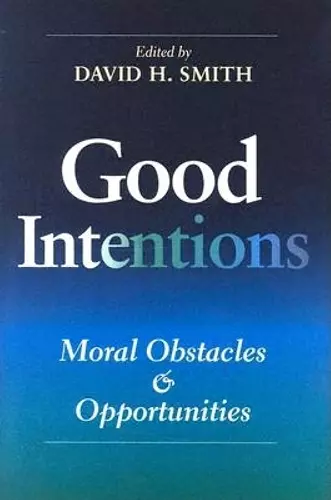Good Intentions
Moral Obstacles and Opportunities
Format:Hardback
Publisher:Indiana University Press
Published:4th May '05
Currently unavailable, and unfortunately no date known when it will be back

A stimulating book on the questions of whom—and how—to help.
A stimulating book on the questions of whom -- and how -- to help.
It seems self-evident that giving is a good thing. But there are profound arguments against a social stress on giving, many of them couched in the language of justice. In this book, scholars from a variety of fields associated with philanthropy discuss the moral issues surrounding efforts to do good. The chapters are arranged in five parts: "Important Exemplars," "Deciding Whom to Help," "Issues for Religious Communities," "The Importance and Insufficiency of Charity," and "Retrospect and Prospect."
The contributors are David M. Craig, Elliot N. Dorff, David C. Hammack, Amy A. Kass, John Langan, S.J., Paul Pribbenow, Paul G. Schervish, David H. Smith, William M. Sullivan, Philip Turner, and Patricia H. Werhane.
Besides helpful editorial material, this work includes ten papers that were presented in a seminar sponsored by the Center on Philanthropy at Indiana Univ. (part of the IU School of Liberal Arts at Indiana Univ.-Purdue Univ. Indianapolis). All of the essays address philanthropy—its definition, relationships, motives, forms, history, and precepts. Amy Kass discusses what philanthropy meant to Booker T. Washington: largely education in black self-help. What it meant to Jane Addams, Paul Pribbenow explains, is the common work of citizens. Secular standards for the morality of philanthropy are the subject of essays by Patricia Werhane and Paul Schervish, and by David Craig in the best of the essays. Religious standards for the moral aspects of philanthropy are the subject of essays by Elliot Dorff (Jewish), Philip Turner (Protestant), and John Langan (Catholic). David Hammack provides a fascinating history of American nonprofit organizations. The final essay by William Sullivan gives readers reason to worry because American inequality is increasing at the same time that effective, democratically based philanthropy is decreasing. Those who can learn much from this book include not only philanthropic givers and takers, such as foundation executives, college administrators, and church leaders, but also moral philosophers, theologians, and government officials. Summing Up: Recommended. Lower-level undergraduates and above; general readers.
-- J. M. Betz * Villanova University , 2006jan CHOICE *Although some readers may find certain essays more valuable to them at different times than do others, this book should be read and reflected on by all who take the subject of philanthropy seriously.
* Nonprofit and Voluntary Sector QuarterISBN: 9780253345318
Dimensions: unknown
Weight: 526g
256 pages